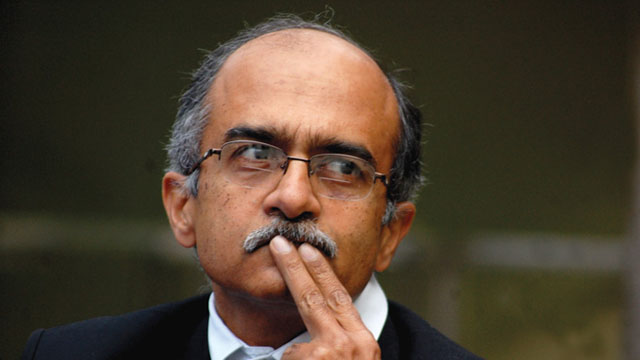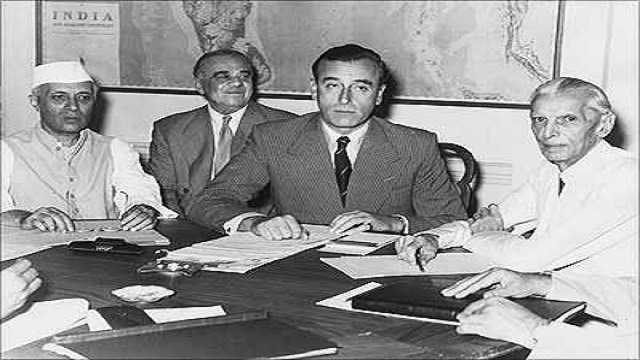Bhushan forgets the fact that deployment of army in the state is a sensitive issue. What if people want to break away from India in this referendum?
Hell broke loose after Aam Aadmi Party leader Prashant Bhushan suggested referendum on the issue of army presence in Jammu and Kashmir. The strong reactions that followed included his party leader and Delhi chief minister Arvind Kejriwal’s statement too.
“People should be asked whether they want the Army to handle the internal security of Kashmir. Any decision which does not have the backing of the people is undemocratic. If people feel that the Army is violating human rights and they say they don’t want the Army to be deployed for their security then the Army should be withdrawn from the hinterland… there should be a referendum on whether people want AFSPA to continue in the Valley or not,” Bhushan said in an interview to Aajtak’s Seedhi Baat programme.
Kejriwal instantly distanced himself from the issue by saying that the view was of leader’s own and that there was “no question” of holding referendum on the sensitive issue. “The feelings of the local people should be taken into account, otherwise it will be a threat to democracy. But our party is not in favour of any referendum,” he added.
CPI-M leader Sitaram Yechury too said that the matter was to be decided by the government and did not pertain to public debate as it was a matter of internal security.
BJP leader Arun Jaitley wrote in his blog that the “issues of national security cannot be decided by populism or referendum. They can only be decided on security considerations. Till such time the infrastructure of terror remains, the presence of the army in Jammu and Kashmir is essential”.
It should be noted that Bhushan had suggested a plebiscite in Jammu and Kashmir where people must be free to decide whether they wish to stay with India or otherwise. That time too he had come under severe criticism.
Bhushan is a lawyer who has long list of Maoists as his clientele. He is a well-known Maoist sympathizer. Even after finding AAP with Kejriwal, Bhushan has continued extending his services to them despite the fact that the Maoists have harmed the general public in many ways.
In the famous abduction of Sukma Collector in 2012, he was named as a mediator by Maoists, a position which he refused. Although he appealed for the Collector’s release, he also suggested the government to agree to their demands despite knowledge of their wrongness.
Bushan has yet not retracted from the statement and has explained his stance which is no different from the earlier one.
Bhushan was reported saying that his party considers Kashmir as an integral part of India and that it was “needless” to say that he shared the same view. “Any reference to referendum shouldn’t be misconstrued to mean plebiscite on Kashmir’s relationship with India,” he said.
“I told two television channels that there was considerable alienation among the people of Kashmir which is primarily because of the human rights excesses by the security forces. The other factor was the impunity from prosecution given to them (security forces) by the Armed Forces Special Powers Act (AFSPA). I had said that impunity of AFSPA should be removed in order to win the hearts of the people of Kashmir,” he said.
Bhushan said it was his view that the deployment of armed forces “in huge numbers within Kashmir not for external defence or to prevent infiltration but for the security of the people … should not be done without the consent of the people of Kashmir”.
“Of course the union government is fully entitled to deploy the army for external defence in Kashmir as well as protecting the minorities there if there is a threat to minority rights. It is the prerogative of the state to deploy security forces including armed forces for any stretch (of time) to internal and external security. This prerogative must be exercised in the best interests of people and as far as possible with their consent,” he defended.
Bhushan is not taking into account the view that separatist sentiments may influence the referendum and that the people may deliver the verdict against being with India. The grave issue of cross-border terrorism is weaning India away and with this result in hand, Pakistan will created trouble for India further.
The anti-national sentiment, that Bhushan repeatedly shows may be a personal view. But it cannot be denied as an outcome of AAP’s lack of ideology. This lack of ideology in AAP is pretty evident. Till now the party has not been able to prove itself any different from other parties except for the stance on corruption which also seems to be fading. Their repeated public goof ups and careless remarks have landed them in hot soup many times.
Jaitley’s blog sums it for AAP aptly: “…political parties which emerge as a transient reaction to a given situation can be non-ideological. They evolve their ideology as they grow. This can lead to both speculative and serious concerns. The ideological position of the Aam Aadmi Party on various issues is not known. It is only after the elections that initial indications coming from its leaders show that it stands for nationalization of airports and natural sources, for a soft and weak position on India’s security issues and for high subsidies which will lead to higher taxation. Symbolism rather than substance has been displayed in the last ten days. I hope sensible elements in the Party seek to reverse this position. Otherwise the slope downwards will be faster than the movement upwards.”





